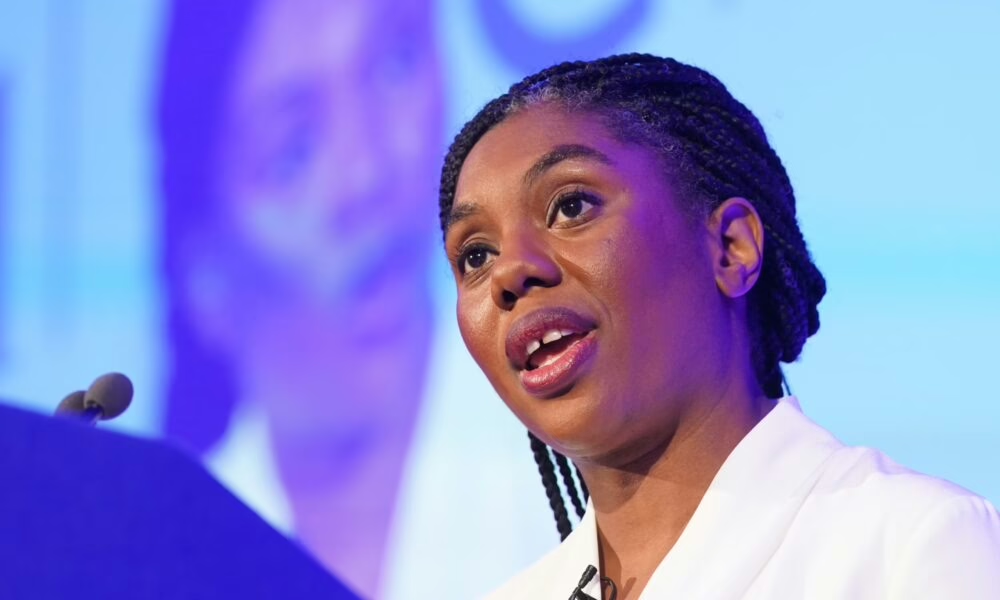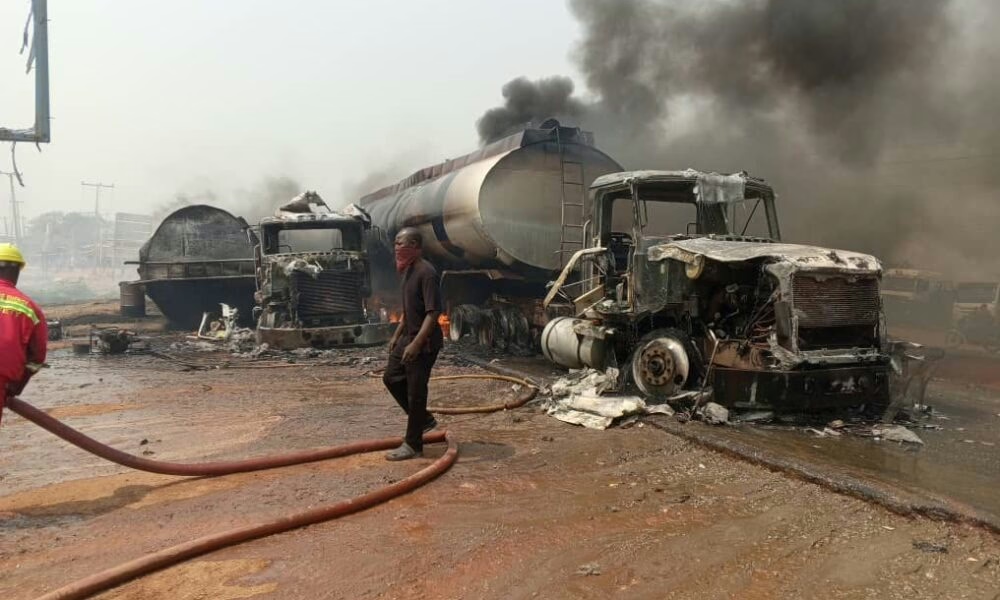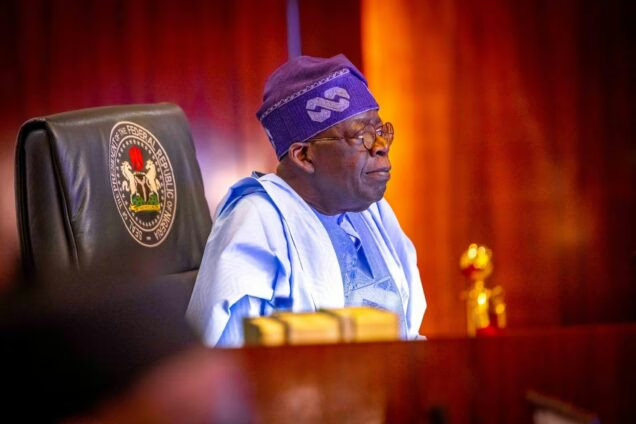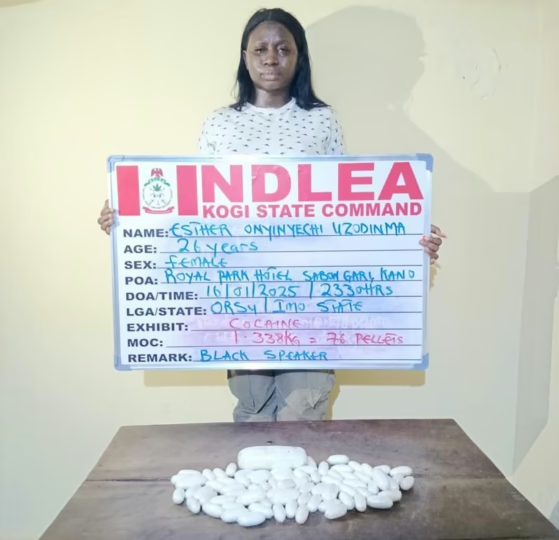arrest the recent spate of aviation accidents in the country, the Federal Government has summoned to a meeting the heads of relevant agencies such as the Nigerian Safety Investigation Bureau, the Nigerian Civil Aviation Authority, the National Airspace Management Agency, and the Nigerian Meteorological Agency, among others.
The meeting, which will be presided over by the Minister of Aviation and Aerospace Development, Mr Festus Keyamo, is expected to hold this week in Abuja and will review recent accidents and come up with recommendations that will ensure the safety of the aviation industry in the country.
On Sunday, November 12, 2023, a Boeing 737 passenger jet belonging to Aerocontractors Airlines crash-landed at the Nnamdi Azikiwe International Airport, Abuja. Although no injury or fatality was recorded, the NSIB confirmed that the aircraft got involved in a “serious accident” around 10.47am upon arriving at the NAIA from Lagos. This led to the closure of the runway.
The HS 125 aircraft with registration number 5N-AMM, operated by Flint Aero, suffered considerable damage, but there were no casualties. The incident led to the closure of the airport by the Federal Government, which also ordered an investigation to determine the cause(s).
Earlier on Friday, November 3, 2023, a major national tragedy was averted when an aircraft conveying the Minister of Power, Adebayo Adelabu, and 12 other passengers and flight crew skidded off the runway of the Ladoke Akintola Airport, Ibadan, Oyo State.
On August 1, 2023, a Jabiru J430 light single-engine airplane with nationality and registration marks 5N-CCQ operated by Air First Hospitality & Tours, which was on a test flight with two persons on board, crashed in Oba Akran area of Ikeja, Lagos State, and burst into flames.
Keyamo told Sunday PUNCH in a telephone interview on Friday that the meeting with the heads of the aviation agencies and regulators would hold this week after his return from an official trip to Dubai, United Arab Emirates.
He said, “What I have done in the last few days is that I have called the heads of the agencies in charge of regulation, and I’ve told them to come and explain to members of the public. I’m sure you saw their interviews on television. I said, first of all, go and quickly explain to members of the public what you have done and exactly the measures you have taken concerning the inspection of these aircraft, ensuring that the safety standards are met and all that. They have granted one or two interviews in their respect.
“Now, I am calling a meeting again from here in Dubai, where I am for one or two official assignments. I’m speaking to you from Dubai. The moment I come back to Nigeria, I have indicated that I’m calling a meeting of the heads of the regulatory agencies again to further question them on the steps they’re taking concerning these accidents. I’ve also instructed the Nigerian Safety Investigation Bureau to brief me because the only time we can accurately tell the cause f of these near mishaps is for the bureau to say what happened.
“We are still waiting for the report; so, we cannot guess what exactly happened. But before that comes out, we should just do the normal safety checks again on all our systems and on all the procedures that we normally take to check aircraft, which of course I’ve told the head of the agencies to do, and I’ve called all the heads of the agencies from Dubai to a meeting.”
When asked when the meeting would take place, the minister said, “It’s a private internal meeting. It doesn’t have to do with members of the public; it is just our internal checks to be sure that we have done all we need to do and that will be next week.
“Saying the Federal Government is worried about the recent incidents may be too extreme, but we are taking all necessary measures to ensure that all the safety regulations are in place. Anything that goes beyond them will be an act of God; but for anything humanly possible, anything that humans should do to ensure that there is safety, we’ll take care of them.”
He, however, clarified that by the 2022 amendment to the Nigeria Civil Aviation Act, regulation of the industry had been removed totally from the control of the ministry or the minister, but that as the political head, he would do everything possible to ensure the safety of the flying public.
Keyamo added, “As I speak with you, the minister has no say in the regulation; it is the heads of the agencies in charge of regulation, which are NAMA and the NCA, who have the final say regarding issues of regulation. They did that in a bid to remove regulation totally from political influence. For instance, as I speak with you, there are many times some people in political offices called me when there was bad weather and asked me to instruct the heads of the agencies to pass a waiver for them to take off. I would just tell them, no, I don’t have such powers.
“They (agencies’ heads) have the final say regarding issues of safety. There are times that they (influential people) will call you that the runway is closed and they say one runway is closed, I just want to land only this one plane, can you please tell the head of your agency to just allow us to land? I’ll tell them no; they (agencies) have the final say because that is a professional judgment on their part. In all of these, if these issues have to do with, for instance, the worthiness of the planes, how cold the weather is, how safe it is for them to land and all that, these are professional judgments and the heads of the agencies make the final call.
“Now, what we can do on our part, which is one of my KPIs and which I have done already, is to call them to say, have you done all that you have to do? In terms of checking these planes, making sure they’re airworthy, making sure that they are fit to fly. That is all we do at the level of the ministry, just ensure that they apply the rules to the letter, but not to reverse or interfere with their decisions.”
At a recent aviation stakeholders’ meeting in Lagos, Keyamo said NAMA had indeed been purchasing obsolete equipment for air navigation.
Apart from obsolete equipment, experts in the industry also noted that most of the airports in the country lack functional navigational equipment that would ensure safe operations, such as Instrument Landing System and lights for night operations.
Poor visibility occasioned by bad weather also contributes to accidents in the aviation industry, just like factors such as bird strikes and infiltration of airports by grazing animals and unauthorised persons, aging aircraft and equipment and poor maintenance, among others.
The Director of Operations, NAMA, Matthew Pwajok, listed airports whose ILS had been calibrated, those with ongoing installations and those that had been completed, adding that the Ibadan airport was not among those listed.
According to him, apart from the absence of the ILS, the airport also does not have an airfield lighting system, which falls under the purview of the Federal Airports Authority of Nigeria.
Meanwhile, the NSIB said it was carrying out investigations into the immediate and remote causes of the three recent air accidents that occurred in Ibadan, Abuja and Port Harcourt airports.
The bureau also said it was putting in place safety recommendations that would be given to operators and regulators in the aviation sector to forestall the recurrence of such accidents.
The Director, Public Affairs and Consumer Protection, NSIB, James Odaudu, told Sunday PUNCH that the investigations were not aimed at punishing anyone, but to ensure safety in the business of air transport services in Nigeria.
He said, “The essence of the NSIB investigation is to unravel the immediate and remote causes of the incidents or accidents as the case may be. The end product of the NSIB investigations is the safety recommendations.
“The NSIB investigations are not geared towards finding a culprit and meting out punishment; rather, they are for the issuance of safety recommendations to forestall the recurrence of such events.
“Now, when the NSIB issues a safety recommendation, depending on who is involved in whatever aspect, whether the airport manager, airlines, regulators, NAMA or NCAA, each of them will look at the safety recommendations and pick what concerns them and try to implement the recommendations.”
“This is to ensure that the accidents or incidents don’t reoccur. So, the NSIB is going to make recommendations that should be implemented by operators. For the recent accidents, our investigations are ongoing.
“Sometimes, it could be technical, human, natural, etc, and all these things are to be investigated and examined so that when the final report is out, it will be all-encompassing.”
The Chairman of Air Peace, Alex Onyema, who featured on a programme of Channels Television on Thursday, said domestic airline operators were facing a lot of challenges, including the inability to maintain their aircraft as scheduled due to foreign exchange scarcity.
He explained that the major maintenance works on aircraft were being done outside Nigeria and operators had been finding it difficult to get the required forex from the Central Bank of Nigeria even when naira equivalents were made available.
Onyema said, “Of course, when all the airlines in Nigeria want to buy spare parts, we go through forms ‘A’, ‘M’ and all that to get forex from the Central Bank of Nigeria. Normally, after bidding they take your money and debit your naira deposition, but have you been given the money? No. So, most of the airlines are in the same position. And of course, you borrowed that money at 26 per cent interest rate and it has been trapped for six to eight months. But the Vice-President (Kashim Shettima) opened up and said, ‘I have told the central bank governor that we need to get this sorted out’.
“Apart from the issues of foreign exchange and cheap funding, other airlines in the world borrow money at three, four and five per cent. In Nigeria, we borrow at 26 per cent, and a situation where you give foreign airlines multiple destinations into your country, multi frequencies. An airline will leave its country, lands in Abuja, drops off passengers, takes off to Port Harcourt, drops passengers, picks passengers from Port Harcourt and go back to Abuja. It is not done anywhere, not even in America.
“Everything about the aircraft is in dollars. Everything is imported from abroad. Today, you are buying one dollar for N1,150 and you are expecting the fares to be as when the dollar was N350. Today you are buying fuel for over N1,000 and you are expecting to be paying the same thing as you were paying when fuel was maybe N300 per litre.”
Domestic airlines under the aegis of the Airlines Operators of Nigeria confirmed on Friday that the government had continued to withhold funds meant for the smooth operations of indigenous carriers.
It was also gathered that the funds, running into several millions of dollars, were being withheld by the CBN, whereas the bank had some paid foreign airlines.
“This is an issue that has continued to drag since the past nine months for some airlines, particularly for Hajj operations. Some domestic airlines airlifted pilgrims during the Hajj and they are yet to be paid, but the Saudi operator that came into Nigeria to pick up 40 per cent of our pilgrims has been paid,” an AON official and Managing Director, TopBrass Aviation, Capt. Roland Iyayi, stated.
Iyayi, a former Managing Director, Nigerian Airspace Management Agency, explained that for Hajj operations, the Saudi authorities insisted that their own carrier must carry 40 per cent of the passenger traffic from Nigeria.
He stated, “So, Nigerian carriers airlift about 60 per cent of our pilgrims to Hajj. But the Saudi carrier has been paid completely in dollars. However, the Nigerian carriers, including Arik, Aero, Azman, Air Peace and MaxAir, have not been paid.
“In fact, Azman Air had to suspend operations simply because it was being owed money by the government.”
Explaining how the funds accrue at the CBN, Iyayi said Hajj pilgrims were not allowed to pay for tickets to airline operators; rather, they pay to the National Hajj Commission.
He added, “So when the pilgrims pay at the exchange rate established before the operations, those funds are paid through the Hajj commission into the coffers of the CBN. So the Hajj commission confirms that the domestic airlines have performed and then it authorises payment.
“The Hajj operations also require the domestic carriers to provide it with the performance bond, a bank guarantee, meaning that assuming they were paid any money and they defaulted, then they will call up the bank guarantee.
“But even with the bank guarantee provided by the domestic carriers, the Hajj commission did not pay them upfront as required. So, these funds remain stuck with the Hajj commission at the CBN, yet the operations have been concluded months ago.”
Meanwhile, efforts to get the CBN to respond to this were unsuccessful. Its spokesperson, Abdulmumin Isa, had yet to respond to messages sent to his mobile phone as of the time of filing this report.
Air Peace, Azman Air, Max Air and United Nigeria Airlines are domestic airlines whose $54m, (N43.4bn) is reportedly trapped in the CBN.
Air Peace is said to have about $25m trapped; Max Air, over $20m; while Azman Air reportedly has about $7m; and United Nigeria has about $3m with the apex bank.
Replying, Keyamo said, “The issue of liquidity from the central bank is outside my purview. Access to forex is outside my purview as minister of aviation. However, the President and Commander-in-Chief, Bola Tinubu, recently directed that I meet the central bank and currently, we’re talking and working out means by which foreign exchange will be available to players in the aviation sector.
“That has also started with the clearing of the backlog of forex owed foreign airlines. I’m sure you saw the reports recently that we have started paying the backlog of forex to foreign airliners and to make some available to our local players also.”
The Nigerian aviation industry has over the years witnessed several crashes, many of which took lives and threw families into mourning.
Among the most recent was the August 29, 2015, Nigerian Air Force plane crash in Kaduna, which claimed the lives of seven persons, including four military officers.
On October 10, 2015, an F-7Nl jet crashed in Kaduna, killing one person and injuring several others. The jet, which belonged to the Nigerian Air Force, was on a training mission when it crashed into a residential area.
On November 15, 2016, an AgustaWestland 101 helicopter crashed in Makurdi, Benue State. Similarly, on July 6, 2017, a NAF Agusta 109 light utility helicopter crashed in the Borno River without any casualties.
In August 2017, an F-7Nl jet crashed and claimed a life. Two F-7Ni aircraft collided mid-air around Katampe Hills in Abuja on September 28, 2018, during a rehearsal for Nigeria’s 58th independence anniversary. Tragically, one person died in the incident.
On June 7, 2018, a chopper that was to convey then Vice-President Yemi Osinbajo from the Nigeria Customs Command and Staff College, Gwagwalada in Abuja, was forced to land, a few seconds after takeoff.
On January 2, 2019, five crew members aboard an NAF Mi-35 were killed when the aircraft crashed near Damasak, Borno State.
On February 2, 2019, a helicopter conveying Osinbajo crash-landed in the Kabba area of Kogi State, but the ex-VP and others managed to escape.
Another NAF helicopter crashed while landing in Katsina State on June 12, 2019, resulting in no fatalities.
In August 2020, former First Lady, Aisha Buhari, and her daughter, Hanan, escaped a plane crash. The private jet conveying them was reported to have lost control while on its way to Nigeria from the UAE. The private jet with registration number GIV N52MK was said to belong to her in-law, Mohammed Indimi.
Narrating the incident, the former first lady, said in a tweet on her X handle, “On our way back, the Nigerian Air Force flight encountered a violent clear air turbulence which was navigated safely and professionally by the Captain and crew of the flight,”
On February 22, 2021, seven NAF personnel perished in a plane crash shortly after takeoff from the Nnamdi Azikiwe International Airport, Abuja. They were going to Minna, Niger State, to rescue abducted students and staff members of Government Science College, Kagara.
On March 31, 2021, Air Commodore Edward Gabkwet, former NAF spokesperson, confirmed another aircraft crash and expressed uncertainty regarding the fate of the two pilots involved.
On May 21, 2021, a military Beechcraft 350 aircraft conveying 11 persons, including the Chief of Army Staff, Ibrahim Attahiru, crashed and killed all onboard at the Kaduna International Airport.
On July 18, 2021, an Alpha Jet aircraft was shot down by bandits in Zamfara State. The pilot, Flight Lieutenant Abayomi Dairo, miraculously survived the crash.
In April 2022, a trainer aircraft crashed in Kaduna, resulting in the death of two pilots.
In February 2023, NAF was fortunate not to record a crash after one of its jets lost its tyre mid-air and made an emergency landing on its belly at the Lagos airport.
On July 14, 2023, a fighter jet belonging to NAF crashed in Makurdi, Benue State, with the two pilots on board successfully ejecting from the aircraft.
Before the recent crashes, the nation witnessed some fatal accidents as 261 persons died after a McDonnell-Douglas DC-8 aircraft flying Hajj pilgrims to Sokoto on behalf of Nigeria Airways crashed in Jeddah, Saudi Arabia, in July 1991.
In January 1973, a total of 176 persons died after a Boeing 707 chartered by Nigeria Airways to fly pilgrims back from Jeddah to Lagos crashed at the Kano airport, while in September 1992, all 158 aboard died after a Lockheed C-130H Hercules operated by Nigerian Air Force crashed in the Ejigbo area of Lagos.
In June 2012, a Dana Air plane crashed into a residential area of Lagos and killed 153 people, made up of 146 passengers and seven crew members.
In November 1996, the nation lost 144 people after a Boeing 727 operated by ADC airline en route from Port Harcourt to Lagos crashed in Ejirin, near Lagos, while in October 2005,117 people died after a Boeing 737 operated by Bellview Airline crashed near Lagos.
Similarly, in December 2005, 108 people, mostly students of Loyola Jesuit College in Abuja, were killed after a McDonnell-Douglas operated by Sosoliso Airlines crashed while landing at the Port Harcourt airport. Two persons were rescued alive.
A year later, 97 people perished after a Boeing 737 operated by ADC Airlines crashed near the Abuja airport shortly after takeoff.
The first major plane crash in Nigeria after independence was recorded in November 1969. A total of 87 persons perished after a Vickers VC-10 operated by Nigeria Airways crashed in Lagos.
In May 2002, a BAC One-Eleven jet operated by EAS, on a flight from Jos to Lagos via Kano, crashed shortly after takeoff from the Kano airport and killed 72 persons.











